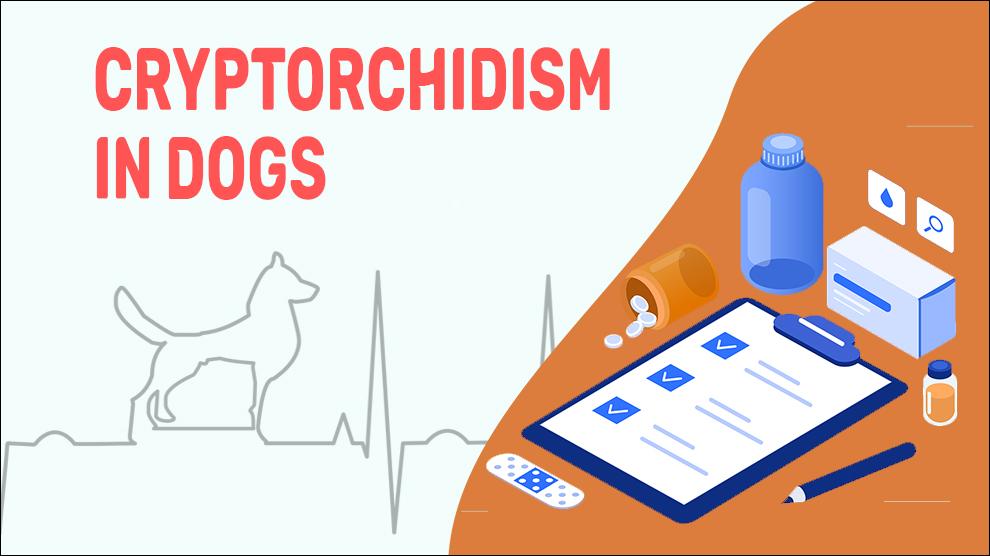Canine Cryptorchidism is the malfunction in male dogs’ one or both testicles movement into the scrotal sac. The testes develop near the abdomen, close to the kidneys. Normally, the testes descend to their actual anatomical scrotal position should be completed by two months of age. In some dogs, it may take some time but after 4-6 months of age, the descent is very rare.
Cryptorchidism may be assumed to be present if the testicles are not descended to the scrotum even after two to four months of age.
In the fetus, an important player in testicular descent is a mucofibrous structure called the gubernaculum (genito-inguinal ligament) that connects the testicle to the scrotum. When this structure fails to properly develop, the testicle descent to the scrotum is affected. Retained or undescended testicles vary in their anatomic position. They are typically found in the abdomen or the inguinal canal (found in the groin region), or prescrotal area, or just under the subcutaneous tissues in the groin region, between the scrotum and inguinal canal.
The right testicle is retained twice more likely as the left testicle. The prevalence of Cryptorchidism in dogs is approximately 1- 2%. The condition is more prevalent in smaller breeds than in larger breeds in a ratio of 3:1. The condition appears to be a sex-linked autosomal recessive trait that is common in certain breeds, although the exact etiology is not fully understood.
Symptoms Of Cryptorchidism
- Bilateral Cryptorchidism (occurring on both sides)
- Unilateral Cryptorchidism (occurring on one side)
- Femininizing syndrome
- Acute abdominal pain
Treatment Options For Cryptorchidism
It is important to understand that for the treatment of cryptorchidism in dogs the focus is management rather than cure. Success in treatment means minimizing pain while maximizing your dog's comfort and function.
Neutering is recommended:
- Analgesics (drugs to relieve pain)
- IV may be used for rapid medication administration or fluid therapy
Home Remedies For Cryptorchidism
Cryptorchidism is a condition that is not improved by conservative treatment. So treatment is rarely recommended. Discuss with a veterinarian for any home care specific to your dog’s situation.
Prevention Of Cryptorchidism
There are no dependable methods to prevent cryptorchidism in dogs, particularly since few of the common types are hereditary. But you can take steps to help your dog live a healthy life.
Affected Breeds Of Cryptorchidism
Pomeranian, Yorkshire Terrier , Dachshund, Chihuahua, Schnauzer, Maltese, Toy Poodle, Siberian Husky, English Bulldog, Boxer, Male Dogs
Additional Facts For Cryptorchidism
1. Causes:
Congenital - Autosomal recessive inherited trait
2. Types:
- Unilateral – Occurring on one side
- Bilateral – Occurring on both sides, both testicles are affected
3. Mortality:
Dogs with cryptorchidism can develop spermatic cord torsion which is an extremely painful condition where the testicle twists upon its connective tissue with impeded blood flow. The testicle swells becoming kinked and blocked as it becomes engorged with blood causing irreversible damage or death.
4. Diagnosis:
- Routine physical exam
- Hematology, urinalysis
- Serum chemistry profile
5. Prognosis:
Mild cryptorchidism may not even require treatment but will be able to resolve in due time.
In more acute cases of doubtful or difficult conditions, always consult a veterinarian.
When To See A Vet
Time to visit the vet clinic for an examination, if you notice any of the following:
- Bilateral Cryptorchidism (occurring on both sides)
- Unilateral Cryptorchidism (occurring on one side)
Food Suggestions For Cryptorchidism
What to feed?
- Look for lean cuts as it is easier to digest.
- Pack the diet with easy-to-digest fatty proteins like lamb, chicken, turkey, fish, and eggs.
- Brown rice, lukewarm (never hot) chicken soup with Low sodium or chicken breast and cooked vegetables is perfect for the ailing pup.
- Organ meats(liver), poultry, pork, and fish should be thoroughly cooked to kill any germs.
- Meat-flavored baby food or semi-moist pet food with boiled chicken.
Top foods
- Leafy greens (Spinach, Kale, lettuce)
- Poultry like chicken and turkey
- Turmeric, Red Bell Peppers
- Broth or stock of boiled chicken bones
- Tuna, salmon, cod, whiting, whitefish, trout, mackerel, sardines, and herring
- Mushrooms
- Cooked or raw liver, Red Meat
- Plant-based proteins peas, chickpeas, lentils
- Canned pumpkin, Carrots
- Berries, apples, banana
Conclusion
Head to the vet only if: The cryptorchidism gets worse. Usually, it is not necessary
Although the condition is usually self-limiting and benign, it is always good to get the opinion of a vet. There are no reported behavioral or neurological problems.
Maybe neutering the dog offers some help in minimizing subsequent incidences, although there are no definite ways to prevent the condition.

















